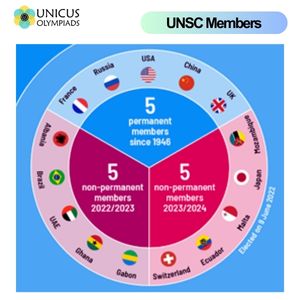

The United Nations Security Council (UNSC) is one of the six main organs of the United Nations, responsible for maintaining international peace and security. It is composed of 15 members: 5 permanent members and 10 non-permanent members. The five permanent members, often referred to as the "P5," are China, France, Russia, the United Kingdom, and the United States. These countries hold a unique and significant position within the UNSC due to their veto power, which grants them the ability to block any substantive resolution, regardless of the majority opinion. The role of the permanent members in resolving conflicts is critical, as their decisions have far-reaching implications for global diplomacy, security, and conflict resolution. This article explores the role of the permanent members of the UNSC in resolving conflicts, their influence, and how their actions affect international peace and security.

The UNSC is charged with the primary responsibility of maintaining international peace and security under the United Nations Charter. It has the authority to take action on a wide range of issues, including conflicts between countries, civil wars, and threats to global stability. The UNSC has the power to impose sanctions, authorize the use of force, and establish peacekeeping missions.
The five permanent members of the UNSC (China, France, Russia, the United Kingdom, and the United States) were granted special status as part of the post-World War II order in recognition of their military and political influence. These countries are the only ones with veto power, meaning that any one of them can prevent the adoption of a substantive resolution, even if it has the support of the other members. This veto power grants the P5 countries significant influence over the UNSC’s decisions and global conflict resolution efforts.
The permanent members of the UNSC have a unique role in conflict resolution due to their veto power and their individual and collective influence in global diplomacy. They are responsible for making critical decisions on actions to be taken in response to international conflicts. Their involvement in resolving conflicts often depends on their geopolitical interests, alliances, and national priorities.
The most significant role of the permanent members in the UNSC is their veto power. The veto power allows any of the P5 members to block resolutions, including those that propose military intervention, sanctions, or peacekeeping operations. This power gives the P5 countries the ability to influence the direction of international peace and security efforts, and in some cases, to prevent resolutions that are not in line with their national interests.
In addition to political and military interventions, the P5 countries play an important role in peacekeeping and providing humanitarian aid. The UNSC can authorize peacekeeping missions, which are deployed to areas of conflict to help maintain order and protect civilians. The P5 countries, particularly those with significant military and logistical capabilities, often contribute troops, funding, and resources to these missions.
The P5 members are also heavily involved in diplomatic efforts to resolve conflicts. As global powers with significant influence, they have the ability to broker peace talks, mediate disputes, and bring parties to the negotiating table. Their involvement is often essential to reaching agreements, particularly in high-stakes conflicts where their national interests are at stake.
Sanctions are another tool used by the UNSC to influence the behavior of countries that threaten international peace and security. The P5 countries have the ability to propose, support, or veto sanctions aimed at punishing or deterring states that engage in aggressive actions or violate international laws.
While the permanent members of the UNSC play a critical role in resolving global conflicts, their dominance has also been a source of criticism. The veto power granted to the P5 often leads to deadlock, with one country blocking resolutions that could be beneficial to global peace. This has led to frustration among smaller nations and the broader international community, particularly when urgent action is needed in crises.
The permanent members of the UN Security Council—China, France, Russia, the United Kingdom, and the United States—are key players in global conflict resolution. Their veto power allows them to shape the direction of international peace and security efforts, whether through military intervention, sanctions, peacekeeping operations, or diplomacy. However, the P5’s dominance also presents challenges, including potential deadlock and bias, which can impede the effectiveness of the UNSC in addressing urgent global issues. Despite these challenges, the UNSC remains the principal international body for managing conflicts and maintaining global peace, with the permanent members playing a crucial role in shaping its actions.